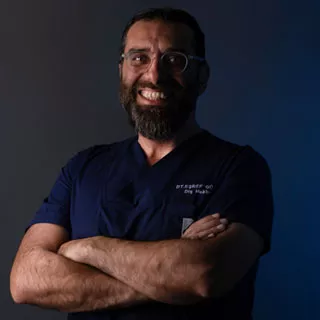OUR DENTISTS
Dt. Eşref Güler
Surgical Procedures and General Dentist
The Role and Importance of Dentists in Maintaining Oral and General Health
Dentists play an integral role in modern healthcare systems by addressing conditions related to the oral cavity and contributing significantly to overall health and well-being. While traditionally associated with the treatment of dental caries and gum disease, the scope of dentistry has expanded considerably, encompassing preventive care, cosmetic improvements, oral surgery, and systemic health monitoring.
The Expanding Scope of Dentistry
Modern dentistry involves more than just treating toothaches and cavities. Dentists today are trained to perform a wide variety of procedures including dental implant placement, orthodontic treatments, periodontal therapy, endodontic interventions, and oral cancer screening. This multidisciplinary expertise allows dentists to manage both functional and aesthetic concerns effectively.
In addition to clinical skills, dentists are increasingly required to understand advances in dental technology, such as digital radiography, 3D imaging, and computer-aided design/manufacturing (CAD/CAM) systems. These technologies improve diagnostic accuracy and enhance treatment outcomes.
Prevention as a Primary Objective
One of the most important aspects of dentistry is preventive care. Regular check-ups, professional cleanings, fluoride applications, and patient education help prevent the development of serious oral diseases. Dentists are in a unique position to detect early signs of conditions such as dental decay, gingivitis, malocclusion, and even oral cancer.
Preventive strategies not only improve oral health but also reduce healthcare costs by minimizing the need for extensive restorative procedures. Public health initiatives in many countries emphasize the importance of routine dental visits as a cornerstone of lifelong health management.
Oral-Systemic Health Connection
There is a growing body of scientific evidence linking oral health to systemic conditions. Periodontal disease, for example, has been associated with increased risks of cardiovascular disease, diabetes mellitus, respiratory infections, and adverse pregnancy outcomes. Inflammatory responses triggered by oral infections can have systemic effects, underlining the importance of early dental intervention.
Dentists, therefore, contribute not only to the management of localized oral conditions but also to the early detection of systemic diseases. Regular dental examinations can reveal symptoms such as dry mouth, gum inflammation, and oral lesions, which may indicate underlying systemic issues.
Cosmetic and Restorative Dentistry
Beyond health maintenance, dentistry also addresses the aesthetic and psychological aspects of a patient’s well-being. Cosmetic procedures such as teeth whitening, veneers, and smile makeovers have become increasingly popular. These services improve self-confidence and social interaction, thereby influencing mental health and quality of life.
Restorative dentistry, including crowns, bridges, and implants, plays a crucial role in restoring function and appearance after tooth loss or damage. Advances in materials science have led to the development of durable, natural-looking restorations that mimic the form and function of real teeth.
Specialties Within Dentistry
As dental science evolves, numerous specialties have emerged to address specific patient needs. Some of the recognized dental specialties include:
- Orthodontics: Focuses on the diagnosis and correction of misaligned teeth and jaws.
- Periodontics: Deals with diseases of the supporting structures of the teeth, particularly the gums and bone.
- Prosthodontics: Involves the restoration and replacement of teeth with crowns, bridges, and dentures.
- Endodontics: Specializes in root canal treatment and the management of dental pulp conditions.
- Pediatric Dentistry: Caters specifically to the oral health of children and adolescents.
- Oral and Maxillofacial Surgery: Addresses complex surgical procedures involving the jaws, face, and oral tissues.
These specializations ensure that patients receive comprehensive and targeted care according to their specific oral health requirements.
The Dentist–Patient Relationship
Establishing a long-term relationship with a dentist promotes trust, consistency, and continuity of care. Through regular interaction, dentists become familiar with a patient’s medical and dental history, preferences, and lifestyle factors, allowing for personalized treatment planning. Additionally, effective communication helps alleviate dental anxiety, encouraging more people to seek timely care.
Patient education is also a fundamental component of modern dental practice. Dentists and hygienists take the time to explain diagnoses, demonstrate proper oral hygiene techniques, and guide patients in making informed decisions about their treatment options.
Ethical and Professional Standards
Dentists are bound by strict ethical codes and professional guidelines that govern patient safety, informed consent, confidentiality, and continuing education. These standards are maintained by national and international dental associations, such as the American Dental Association (ADA), the European Dental Association (EDA), and respective national boards.
Compliance with these standards ensures a high level of professionalism and accountability within the dental field, which ultimately benefits patients and the broader healthcare system.
Conclusion
Dentists are essential healthcare providers whose responsibilities extend far beyond treating toothaches. Their role encompasses prevention, diagnosis, treatment, education, and collaboration across various disciplines. As oral and systemic health are increasingly recognized as interconnected, the value of regular dental care becomes even more significant.
Patients are encouraged to visit a qualified dentist at least twice a year and maintain open communication about their oral and general health. Doing so contributes not only to a healthy mouth, but also to a healthier life overall.
Looking for trusted dental care? Meet our experienced team of dentists at Klinikadent and schedule your consultation today.


